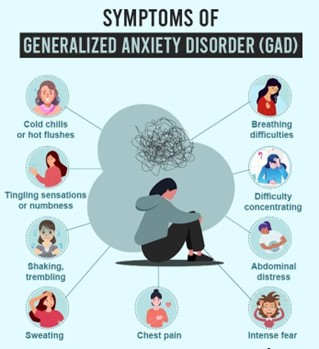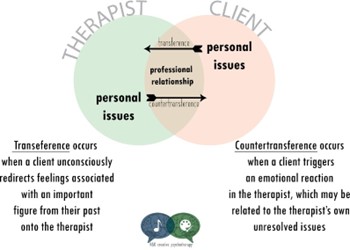A nurse is assessing a client who has generalized anxiety disorder. Which of the following findings should the nurse expect?
Sudden unexplained loss of vision
Constant worry about the undiagnosed presence of an illness for more than 6 months
Obsession over a fictitious defect in physical appearance
Prior physical health followed by the need for two surgeries within the last three months
The Correct Answer is B
Generalized anxiety disorder (GAD) is a type of anxiety disorder characterized by excessive and persistent worry about a variety of different things, including health, work, relationships, and everyday situations. People with GAD may experience physical symptoms, such as fatigue, muscle tension, and restlessness.
Option a is not a typical finding associated with GAD. Sudden unexplained loss of vision may be a symptom
of a neurological or ophthalmologic condition, but not specifically related to GAD.
Option c describes a condition called body dysmorphic disorder (BDD), which is a type of obsessive- compulsive disorder characterized by an excessive preoccupation with a perceived physical flaw. BDD is not typically associated with GAD.
Option d does not describe a typical finding associated with GAD. While physical health issues can contribute to anxiety, the need for surgeries within the last three months is not necessarily indicative of GAD.
Therefore, the correct option is b. Constant worry about the undiagnosed presence of an illness for more than 6 months. People with GAD often worry about their health and the possibility of having an undiagnosed illness, even when there is no evidence of a problem. This worry may persist for six months or more and can interfere with daily life.

Nursing Test Bank
Naxlex Comprehensive Predictor Exams
Related Questions
Correct Answer is D
Explanation
Autonomy is the ethical principle that upholds an individual's right to self-determination and decision- making regarding their own life and treatment. In this case, the unit manager's policy of allowing clients to make their own choice about whether or not to attend group therapy preserves the principle of autonomy.
By not mandating group therapy, the unit manager respects the clients' right to make decisions about their own treatment and encourages them to participate in a way that feels comfortable and aligned with their own goals and values. This promotes a sense of empowerment and self-efficacy in clients, which is important for their overall recovery and well-being.
While beneficence, non-maleficence, and justice are also important ethical principles in healthcare, they are not directly applicable to this particular situation.
Correct Answer is C
Explanation
Countertransference refers to the feelings and emotions that a healthcare provider may have towards a patient. In this case, the nurse is experiencing sadness and reflecting on their own personal experiences with their grandparents while assessing the confused older adult. This can lead to the nurse projecting their own feelings and emotions onto the patient.

Whether you are a student looking to ace your exams or a practicing nurse seeking to enhance your expertise , our nursing education contents will empower you with the confidence and competence to make a difference in the lives of patients and become a respected leader in the healthcare field.
Visit Naxlex, invest in your future and unlock endless possibilities with our unparalleled nursing education contents today
Report Wrong Answer on the Current Question
Do you disagree with the answer? If yes, what is your expected answer? Explain.
Kindly be descriptive with the issue you are facing.
